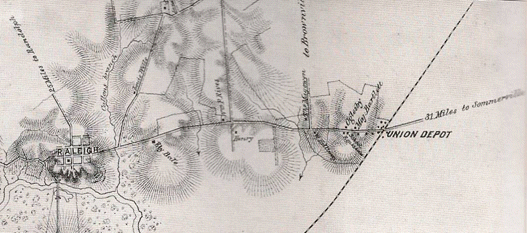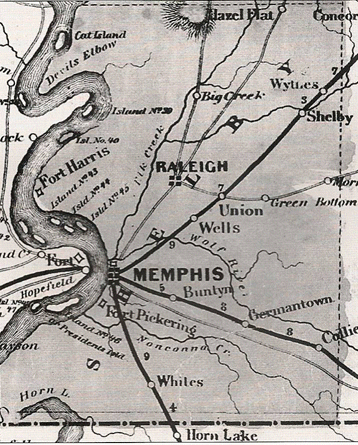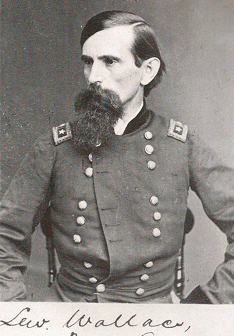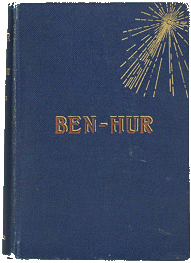|

Union Depot
by Jimmy Ogle
Union Depot appears on the early Shelby County
maps in the middle of the 19th century, nine
miles northeast of Raleigh and about two miles
west of Green Bottom. In 1866 the area becomes
Bartlett.
 On the 1857 map of Shelby County, Union Depot
appears about seven miles northeast of Raleigh
on the Memphis & Ohio Railroad line, at the
intersection of Stage Road.
On the 1857 map of Shelby County, Union Depot
appears about seven miles northeast of Raleigh
on the Memphis & Ohio Railroad line, at the
intersection of Stage Road.
The Memphis & Ohio Railroad (M&O, also known as
the Memphis, Clarksville & Louisville railroad –
MC&L) was charted in 1852 and opened in 1859.
The M&O extended through Arlington, Brownsville,
Humboldt, and Milan in West Tennessee up through
north middle Tennessee (Clarksville) all the way
to Louisville (Kentucky), and eventually
Cincinnati (Ohio). Its line was heavily damaged
during the Civil War, and in 1865, the MC&L went
into receivership and was bought by the
Louisville & Nashville Railroad Company (L&N).
The named Union Depot is derived from the “Union
occupation” during the Civil War to protect its
interests in keeping troop and supply movement
lines open from the north to the steamboat port
of Memphis. The Union had taken occupation of
the Memphis on June 6, 1862, because its
importance as a rail and river center, and
eventually a hospital center for wounded
soldiers. Memphis became instrumental in Gen.
Sherman’s “March To The Sea” and Gen. Grant’s
planning of the Battle of Vicksburg.
The railroad line was restored soon after the
war, reopening on August 13, 1866. Heavy rain
again caused disruption in December 1866 through
a landslide near Clarksville. In 1868 the
railroad was bankrupt and could not pay its
wages; this led to an 11-day strike in February.
The railroad was dissolved on September 30,
1871, then purchased by the L&N. L&N operated
the line as its Memphis Branch, but saw
declining traffic through the early 20th
century, with the last passenger train serving
Clarksville in February 1968. L&N was merged
into CSX, and CSX sold the former MC&L line to
R.J. Corman Railroad Group in 1987, becoming
that company's Memphis Line.
 Also, during the Civil War years, Gen. Lew
Wallace was assign to Union Depot and the lines
extending to Memphis and further to the
northeast towards the Tennessee River, as
Confederate Gen. N.B. Forrest was known for
disrupting service constantly by tearing up the
line in random areas in West Tennessee. Lew
Wallace became known in later with the
authorship of the epic “Ben-Hur”.
Also, during the Civil War years, Gen. Lew
Wallace was assign to Union Depot and the lines
extending to Memphis and further to the
northeast towards the Tennessee River, as
Confederate Gen. N.B. Forrest was known for
disrupting service constantly by tearing up the
line in random areas in West Tennessee. Lew
Wallace became known in later with the
authorship of the epic “Ben-Hur”.
From www.ben-hur.com:
Ben-Hur: A Tale of the Christ by General Lew
Wallace was published by Harper & Brothers on
November 12, 1880. Wallace had been researching
and writing the novel for seven years. He did
most of his work underneath a beech tree near
his residence in Crawfordsville, Indiana. The
novel grew in such popularity during Wallace’s
lifetime that it was adapted into a stage play
in 1899. That dramatization was followed by the
motion picture productions in 1907, 1925, 1959,
and 2016. Ben-Hur has also been adapted into
several cartoons and a musical. Ben-Hur‘s impact
on American culture is larger than the dramatic
adaptations alone. The Supreme Tribe of Ben-Hur,
a national fraternal organization founded upon
Ben-Hur, later reformed into Ben-Hur Life
Insurance. There have even been American towns
named after Ben-Hur.
For the continuing history of
Union Depot, go to
Green Bottom and
Bartlett in the
Community
Histories section of this web site.
|